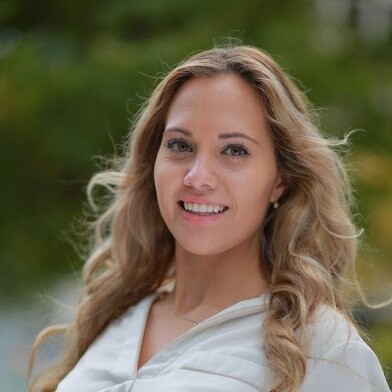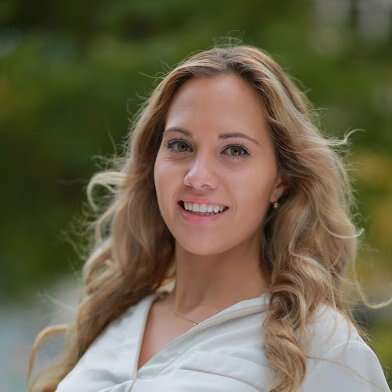Student Feature: Kristina Kokorelias

The RSI Student Feature introduces you to some of the interesting people studying in the Rehabilitation Sciences Institute. From leaders in rehabilitation sciences research to providing care to Toronto’s most vulnerable populations, our students are making an impact on communities at home and around the world.
Do you have an interesting story to share? Fill out our New Student Feature Form or please contact rsi.director@utoronto.ca.

| Kristina KokoreliasYear & Program: 4th Year PhD |
Q. What is your area of research?
Caring for someone with dementia across the illness trajectory can be challenging. Health and social services have the potential to support both caregivers and persons with dementia. While dementia is thought to progress through clinical stages (i.e., mild, moderate and severe)1, few studies have investigated caregiver-identified phases associated with caring for someone across the illness trajectory. In addition, no study has connected health and social service needs to specific caregiving phases across the illness trajectory.
Caregiver-identified phases of Alzheimer’s Disease (AD) may influence the ways in which caregivers make various health and social service use decisions. To date, much of the health and social service decision-making literature has focused on decisions related to institutionalization or medical treatments at the end of life, rather than health and social service utilization to sustain care at home. Qualitative literature highlighting the health care decision-making processes of family caregivers is sparse. The overall objective of this study is to better understand the decision-making processes of caregivers to individuals with AD about health and social service use across the caregiver and illness trajectory. Resulting policy and practice recommendations can optimize access to services to support caregivers and people with dementia.
The specific aim of this study is to generate a conceptual framework or theory that will illuminate caregivers’ needs for services and the decision-making processes caregivers undertake regarding their service use or lack of use across the AD trajectory.
Q. What drew you to the field of rehabilitation sciences?
Throughout my academic training, my interest in the evaluation and improvement of health service resources for older adults with dementia has increased. Living with Alzheimer’s disease and other dementias in the community often necessitates reliance on a family caregiver to provide assistance with the activities of daily living and medical decision making. There is growing awareness of the need to improve accessibility of services and opportunities for people with disabilities. I committed myself to improving the care outcomes of individuals with dementia and their informal caregivers. My goal is to have a career within health services research. I aim to develop multidisciplinary and collaborative strategies for community-dwelling individuals with dementia.
Conceptualizing dementia within the experiences of dementia confers the right to rehabilitation for all people living with dementia. While teams of rehabilitation professionals can provide advice for reintegrating and re-abling people with dementia in the community, family caregivers take on the majority of responsibility for attaining and maintaining the maximum independence of their care recipient with dementia at home, with the assistance of comprehensive rehabilitation services. Rehabilitation therefore provides a set of guiding principles to shape a model of service provision for supporting people with dementia and their family caregivers across the disease trajectory. Training within the field of rehabilitation sciences can enhance my potential to help design, evaluate and translate new and innovative community-based interventions to improve access to health care and caregiver support, quality of life, and health outcomes in this population, while reducing the demand for expensive health services, such as hospital admissions and institutional care.
Q. Why did you choose to pursue your studies in the Rehabilitation Sciences Institute at the University of Toronto?
My decision to pursue a PhD within the Rehabilitation Sciences Institute was fairly pragmatic. Knowing that I wanted to have a research career, I opted for a PhD program in the hopes of setting an expectation for the rest of my career. Then opportunity to work under the supervision of my current supervisor, Dr. Jill Cameron- one of the leading experts in caregiving research-came along at the right time. I was finishing my Masters degree in Health and Rehabilitation Sciences and knew that I had a passion for rehabilitation research and fully intended to continue exploring the many unanswered research questions that emerged from my Masters' thesis. After connecting with Dr. Cameron, I learned of the world-renowned interdisciplinary faculty of the Rehabilitation Sciences Institute.
Working with such a broad range of researchers and clinician-scientists has helped me develop a broad perspective to addressing the challenges that threaten the wellbeing of health system users, and has promoted skills important in communication and collaboration. These skills are essential for me to learn in order to ensure that I can conduct interdisciplinary and translational research following my graduate degree. Working in an interdisciplinary collaboration has also allowed me to learn how to translate the findings of my work beyond academia to include government and industry. Lastly, the fact that The University of Toronto has been ranked number one in Rehabilitation Sciences in the world led me to believe that I could not complete my PhD anywhere else!
Q. What advice would you give to prospective RSI students?
Think whole-heartedly, carefully, and critically about why you want to complete your degree and then seek out the opportunities to help you obtain your 'why'. RSI affords all its students with numerous opportunities for research opportunities, courses, volunteerism, extracurricular hobbies and more that can really help round out your experience and set you apart from many other students in other departments. Try to always remember your vision for why the work is worth it.
Also, get organized. I was organized before but now – now I’m really organized. Find what works for you. While, I’m still trying to find balance, in learning how to say no to research opportunities, to protect time for my own thesis work, and to make space for exercise, hobbies, seeing my loved ones, finding an organization system that works for me and communicating my needs and priorities is helping me to learn how to cope with the challenge of 'balance' that I may be negotiating for my entire career.
Q. Do you pursue any extracurricular activities or hobbies?
I have volunteered with a number of organizations related to my personal and research interests. I have been fortunate to spend my past three years in Toronto, working very closely with community organizations in volunteer roles and within the University of Toronto in graduate student leadership positions. This includes volunteer work with the Alzheimer's Society of Toronto, Haven Toronto and Médecins Sans Frontières/Doctors Without Borders (MSF). I am also a long time volunteer of the Scleroderma Society of Ontario.
In addition to my community service activities, I have been active within the Rehabilitation Sciences Institute, the Faculty of Medicine and the larger University of Toronto community from the first year in my PhD. This includes various committee involvements with the Rehabilitation Sciences Graduate Student Union, sitting as the RSI representative for the Faculty of Medicine Graduate Awards committee and serving on the GradLife Advisory committee for the University of Toronto.
Q. Please share a recent accomplishment!
At the beginning of April, I gave my first invited international presentation at the State of the Science Symposium at the American Occupational Therapy Association Foundation Annual Conference in New Orleans, LA.
